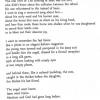6: Poem, “The Real Hero” (“Ha-gibor ha-’amiti shal ha-Akedah”) by Yehuda Amichai, 1983.
Yehuda Amichai, one of Israel’s most famous poets, was born in Germany in 1924 and immigrated to Israel with his parents when he was eleven. This poem was written in 1983, about a year after the beginning of the Lebanon War (1982-2000). The poem is commonly associated with the emergence of waves of protests against this war and is thought to refer to its many silent victims, the fallen soldiers. Amichai chooses the story of the binding of Isaac to critique the manner in which leaders of war, seeking fame and glory, ask ordinary men and women to make the ultimate sacrifice. He retells the story of the Akedah as a story about the silent and naive victims, those who are usually in the margins or shadows of the main cultural narrative. The biblical “heroes” of the story are depicted here in an unflattering light; even God is represented as a celebrity who doesn’t really care about the result of this trial.
Suggested activity: Ask for volunteers among your students and, with their help, try to stage the “frame” that the poem depicts beginning in the second stanza. Who are the characters? Where are they in relation to each other? What are their attitudes? Why does the poet describe Isaac as a “young man who is tanned and manicured”? Why are he and the angel depicted in such a way? Why does Amichai stress the fact that everyone went home except the ram?
Source: Yehuda Amichai, “The Real Hero,” in The Selected Poetry of Yehuda Amichai, trans. Chana Bloch and Stephen Mitchell (Berkeley: University of California Press, 1996), 156.
The_Real_Hero_Amichai3.jpg
 Download image (91.63 KB)
Download image (91.63 KB)

